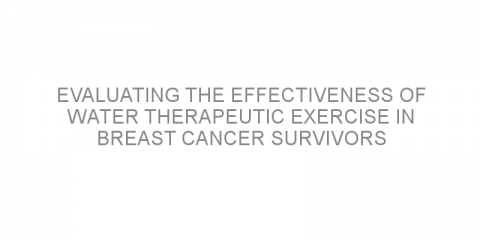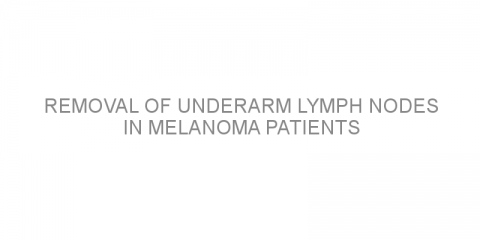In a nutshell The study evaluated the effectiveness of compression bandages applied with different pressures on the skin and subcutaneous tissue in patients with breast cancer-related lymphedema (BCRL). The study concluded that high-pressure compression bandage was more effective in reducing skin and subcutaneous tissue thickness and inflammation in...
Read MoreEvaluating the effectiveness of three exercise programs and intensive follow-up in improving quality of life, pain, and lymphedema among breast cancer survivors
In a nutshell The study evaluated the effectiveness of three exercise programs in improving quality of life (QOL), pain, and lymphedema among breast cancer (BC) survivors. The study found that joint mobility exercise (JME) combined with progressive resistance exercise (PRE) showed promising results in improving QOL and lymphedema after BC...
Read MorePreventing lymphedema with The Optimal Lymph Flow program
In a nutshell This paper studies a lymphedema risk reduction program entitled "The Optimal Lymph Flow". Some background Many breast cancer survivors are at risk of developing lymphedema (build up of fluid that causes swelling in the affected limb) after surgery. A higher body mass index (BMI) also increases the risk...
Read MoreEvaluating the effectiveness of water therapeutic exercise in breast cancer survivors
In a nutshell The study evaluated the effectiveness of aquatic therapeutic exercise in breast cancer survivors for improving symptoms and quality of life. The study found that aquatic therapeutic exercise effectively improved fatigue, pain, and quality of life in these patients. Some background Breast cancer (BC) is the most common...
Read MoreSexual Health, Communication and Cancer
“I think sexual health is at the intersection of mind/body & relationship factors. When sexual health is disrupted, it’s really important to figure out all the pieces…often folks only hear bits and pieces like “use lube” or “use it or lose it” & “we need a holistic approach!”[1] Dr. Sharon L. Bober,...
Read MoreImaging techniques to evaluate treatment of lymph node swelling in patients with breast cancer
In a nutshell This study wanted to find out if taking pictures of lymph nodes using medical imaging techniques helped in finding out if treatment for lymph node swelling was working. The study found that using lymphoscintigraphy helped in evaluating the treatment of lymph node swelling. Some background It is common for lymph nodes to be affected...
Read MoreHow effective is myofascial release after breast cancer surgery?
In a nutshell This article investigated the safety and effectiveness of myofascial release (MR) therapy on women survivors of breast cancer. The authors concluded that MR therapy is safe and resulted in physical benefits (overall shoulder movement, functionality, pain). Some background Surgery and radiation are among the main treatments for...
Read MoreRemoval of underarm lymph nodes in melanoma patients
In a nutshell This study investigated the secondary effects of having axillary lymphadenectomy (ALD; surgery to remove the lymph nodes in the underarms region) in melanoma patients. Researchers suggested that ALD is a low risk surgery for melanoma patients. Some background The standard treatment for melanoma patients spread to the lymph nodes is...
Read MoreRadiation therapy in melanoma: a review
In a nutshell This review explored the effects of radiation therapy (RT) to treat melanoma. Researchers suggested that RT is useful in high risk melanoma to prevent recurrence (when the cancer comes back), however without increasing survival. Some background RT has long been used as a treatment for skin cancer. New surgery methods and knowledge of...
Read MoreWhat’s Next? Side Effects of Breast Cancer Treatment [Infographic]
The American Cancer Society and the American Society of Clinical Oncology have joined forces to build guidelines that can be used to treat survivors of breast cancer by primary care physicians. This is great news because there hasn’t been any standardized follow-up for those breast cancer patients that have undergone surgery, radiation and...
Read MoreGuidelines for the care of breast cancer survivors
In a nutshell These guidelines offer recommendations for the long-term follow-up and care of breast cancer survivors. Some background The 5-year survival rate for breast cancer is currently close to 90%. Thanks to early diagnosis and care, an ever-increasing number of patients are surviving for long periods of time following treatment. Therefore,...
Read MoreWill immediate implant reconstruction reduce the risk of swelling?
In a nutshell This paper studied the risk of lymphedema associated with immediate breast reconstruction compared to mastectomy (removal of entire breast) alone. Some background While improvements in breast cancer treatment have led to better survival, there are still side effects of treatment. Lymphedema, the chronic swelling of arms, body...
Read More








![What’s Next? Side Effects of Breast Cancer Treatment [Infographic]](https://medivizor.com/blog/wp-content/uploads/et_temp/After-Treament-w-text640X320-213481_480x240.jpg)




